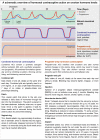Effects of Hormonal Contraceptives on Mood: A Focus on Emotion Recognition and Reactivity, Reward Processing, and Stress Response
- PMID: 31701260
- PMCID: PMC6838021
- DOI: 10.1007/s11920-019-1095-z
Effects of Hormonal Contraceptives on Mood: A Focus on Emotion Recognition and Reactivity, Reward Processing, and Stress Response
Abstract
Purpose of review: We review recent research investigating the relationship of hormonal contraceptives and mood with a focus on relevant underlying mechanisms, such as emotion recognition and reactivity, reward processing, and stress response.
Recent findings: Adverse effects of hormonal contraceptives (HCs) on mood seem most consistent in women with a history of depressive symptoms and/or previous negative experience with HC-intake. Current evidence supports a negativity bias in emotion recognition and reactivity in HC-users, although inconsistent to some extent. Some data, however, do indicate a trend towards a blunted reward response and a potential dysregulation of the stress response in some HC-users. HC-effects on psychological and neurophysiological mechanisms underlying mood are likely context-dependent. We provide suggestions on how to address some of the contributing factors to this variability in future studies, such as HC-dose, timing, administration-mode, and individual risk. A better understanding of how and when HCs affect mood is critical to provide adequate contraceptive choices to women worldwide.
Keywords: Depression; Emotion; Hormonal contraceptives; Mood; Reward; Stress.
Conflict of interest statement
The authors declare that they have no conflict of interest.
Figures

Similar articles
-
To what extent do oral contraceptives influence mood and affect?J Affect Disord. 2002 Aug;70(3):229-40. doi: 10.1016/s0165-0327(01)00356-1. J Affect Disord. 2002. PMID: 12128235 Review.
-
Oral contraceptives and mood in women with and without premenstrual dysphoria: a theoretical model.Arch Womens Ment Health. 2006 Jan;9(1):1-14. doi: 10.1007/s00737-005-0102-z. Epub 2005 Oct 5. Arch Womens Ment Health. 2006. PMID: 16206030 Review.
-
Progestagens and progesterone receptor modulation: Effects on the brain, mood, stress, and cognition in females.Front Neuroendocrinol. 2025 Jan;76:101160. doi: 10.1016/j.yfrne.2024.101160. Epub 2024 Nov 6. Front Neuroendocrinol. 2025. PMID: 39515587 Review.
-
Oral contraceptive use changes brain activity and mood in women with previous negative affect on the pill--a double-blinded, placebo-controlled randomized trial of a levonorgestrel-containing combined oral contraceptive.Psychoneuroendocrinology. 2013 Jul;38(7):1133-44. doi: 10.1016/j.psyneuen.2012.11.006. Epub 2012 Dec 6. Psychoneuroendocrinology. 2013. PMID: 23219471 Clinical Trial.
-
Hormonal Contraceptives and Mood: Review of the Literature and Implications for Future Research.Curr Psychiatry Rep. 2019 Jun 6;21(7):57. doi: 10.1007/s11920-019-1034-z. Curr Psychiatry Rep. 2019. PMID: 31172309 Review.
Cited by
-
The Most Common Side Effects, Concerns and Discontinuation Patterns of Oral Contraceptive Pills Among Polish Women: A Cross-Sectional Study.J Family Reprod Health. 2024 Sep;18(3):170-179. doi: 10.18502/jfrh.v18i3.16659. J Family Reprod Health. 2024. PMID: 39439736 Free PMC article.
-
Hormone-based models for comparing menstrual cycle and hormonal contraceptive effects on human resting-state functional connectivity.Front Neuroendocrinol. 2022 Oct;67:101036. doi: 10.1016/j.yfrne.2022.101036. Epub 2022 Sep 17. Front Neuroendocrinol. 2022. PMID: 36126748 Free PMC article.
-
No Evidence for a Role of Oral Contraceptive-Use in Emotion Recognition But Higher Negativity Bias in Early Follicular Women.Front Behav Neurosci. 2022 Jan 21;15:773961. doi: 10.3389/fnbeh.2021.773961. eCollection 2021. Front Behav Neurosci. 2022. PMID: 35126066 Free PMC article.
-
Population heterogeneity in associations between hormonal contraception and antidepressant use in Sweden: a prospective cohort study applying intersectional multilevel analysis of individual heterogeneity and discriminatory accuracy (MAIHDA).BMJ Open. 2021 Oct 1;11(10):e049553. doi: 10.1136/bmjopen-2021-049553. BMJ Open. 2021. PMID: 34598985 Free PMC article.
-
Depression in Women: Potential Biological and Sociocultural Factors Driving the Sex Effect.Neuropsychobiology. 2024;83(1):2-16. doi: 10.1159/000531588. Epub 2024 Jan 25. Neuropsychobiology. 2024. PMID: 38272005 Free PMC article. Review.
References
-
- United Nations DoEaSA, Popluation Division. Trends in Contraceptive Use Worldwide 2015 (ST/ESA/SER.A/349). 2015.
-
- Larsson G, Blohm F, Sundell G, Andersch B, Milsom I. A longitudinal study of birth control and pregnancy outcome among women in a Swedish population. Contraception. 1997;56(1):9–16. - PubMed
-
- Seedat S, Scott KM, Angermeyer MC, Berglund P, Bromet EJ, Brugha TS, Demyttenaere K, de Girolamo G, Haro JM, Jin R, Karam EG, Kovess-Masfety V, Levinson D, Medina Mora ME, Ono Y, Ormel J, Pennell BE, Posada-Villa J, Sampson NA, Williams D, Kessler RC. Cross-national associations between gender and mental disorders in the World Health Organization World Mental Health Surveys. Arch Gen Psychiatry. 2009;66(7):785–795. doi: 10.1001/archgenpsychiatry.2009.36. - DOI - PMC - PubMed
Publication types
MeSH terms
Substances
LinkOut - more resources
Full Text Sources
Medical
Research Materials

